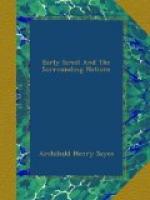The Philistines formed part of the host which invaded Egypt in the reign of Ramses iii. Along with their kinsfolk, the Zakkal, they had already made themselves formidable to the coast of the Delta and of southern Canaan. The sea had long been infested by their ships, bent on plunder and piracy; the Zakkal had attacked Egypt in the time of Meneptah, and the road from Egypt to Asia which skirted the sea had long been known as “the way of the Philistines.” When Ramses iii. overran southern Canaan, Gaza still belonged to Egypt, as it had done for the three preceding centuries; but it is probable that the Philistines were already settled in its neighbourhood. At all events, it was not long before they made themselves masters of Gaza, and thus closed for Egypt the way to Asia. Henceforward Gaza and its four companion cities became the strongholds of the Philistines (B.C. 1200). The southern coast as far north as Mount Carmel fell into their hands: the Zakkal established themselves at Dor, and the port of Joppa was lost to the Phoenicians.
Hardly were the Israelites planted in the Promised Land before they were confronted by the Philistines. Shamgar, we are told, one of the earliest of the Judges, slew six hundred of them “with an ox-goad.” But it was not until the close of the period of the Judges that they became really formidable to Israel. Judah had become a distinct and powerful tribe, formed out of Hebrew, Kenite, and Edomite elements, and its frontier adjoined Philistia. At first there was desultory warfare; the Philistines made raids into Judaean territory, and the Jews retaliated whenever the opportunity occurred. But the Philistines were a nation of warriors, and their forces were recruited from time to time by fresh arrivals from Krete or other parts of the eastern Mediterranean. Year by year, therefore, the Philistine attack became more formidable; the raids of the enemy were no longer confined to Judah, but extended into Benjamin and Mount Ephraim. The Philistines began to dream of conquering the whole of Canaan, which was henceforth to bear the name of Palestine, “the land of the Philistines.”
The Israelitish army was shattered in a decisive battle, the ark of the covenant between Israel and its national God was taken by the heathen, and the priests of Shiloh, the central sanctuary, were slain. The victors marched unresisted through the country, burning and spoiling, and securing the passes by means of permanent garrisons. Shiloh and its temple were destroyed, and its priesthood scattered abroad.
The Philistine supremacy lasted for several years. A few outlaws maintained a guerilla warfare in the mountains of Benjamin, and the prophet Samuel, the representative of Shiloh, was allowed to declare the oracles of Yahveh to his countrymen. But the vanquished population was deprived of the means for revolt. The Israelites were forbidden the use of arms, and no itinerant smith was permitted to enter their territory. The Hebrew who wished to sharpen his ploughshare or axe was forced to go to a Philistine city.




